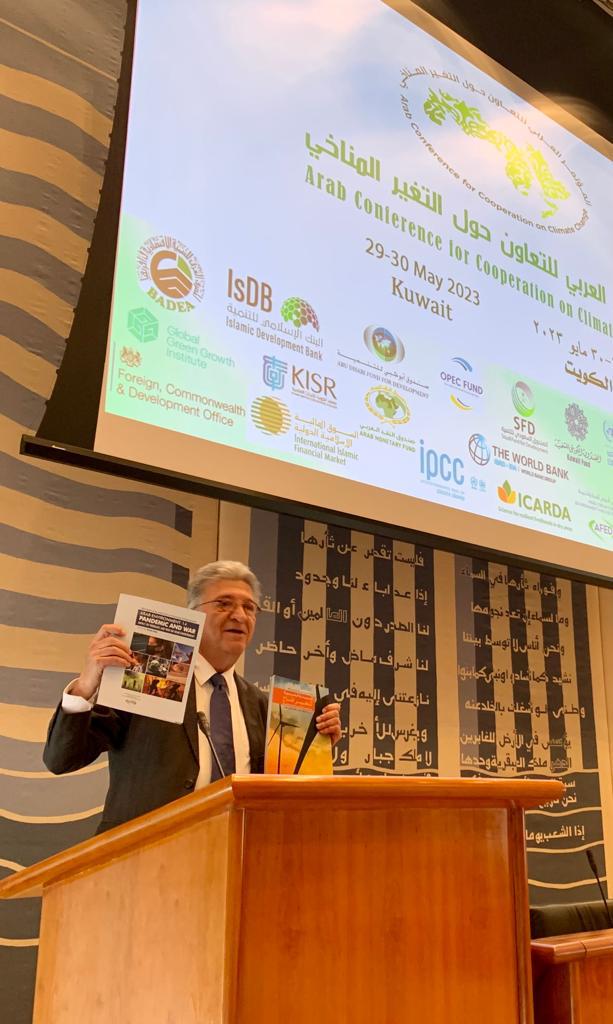
• For inquiries, please contact AFED Secretariat:
Tel.:
+961-1-321800
Fax: +961-1-321900
E-mail: info@afedonline.org
Kuwait, 29/05/2023
The
Arab Forum for Environment and Development (AFED) presented its new report on Impact
of Pandemic and War on Arab Environment, during a regional conference on
cooperation in climate action, hosted by the Arab Fund in Kuwait. The report is
the fourteenth in the State of Arab Environment series launched by AFED in
2008. Previous titles included Impact of Climate Change on the Arab Countries, Green
Economy in a Changing Arab World, Water and Food Security, Sustainable Energy, Ecological
Footprint, Financing Sustainable Development, and Environmental Health. AFED
reports are considered the leading independent reliable source on Arab
environment, which also helped trigger policy changes in all aspects of
sustainable development across the region.
Najib Saab, AFED Secretary General and editor of the new report,
presented its main findings and recommendations, stressing that the coronavirus
pandemic and the ongoing war in Ukraine have caused major disruptions to supply
chains, energy and food availability, high prices and inflation, which also
hampered environmental and climate initiatives and investments. It also turned
out that the Arab countries most affected by these crises were those that had
to deal with them in conjunction with wars and internal conflicts, as well as colossal
economic downfalls.
In addition to historically large water deficits, the rush to
produce more food domestically in some Arab countries, in order to meet
shortages in external supplies, added pressure on fragile lands and outdated,
inefficient irrigation systems. Most Arab countries' spending on social
protection, health and sustainable development goals in general was among the
lowest in the world, making the Arab population less prepared to face emerging
challenges. While a previous report from AFED indicated a deficit in financing
sustainable development goals in the Arab countries, as a group, exceeding $230
billion annually, the new report expected an increase in this figure that could
reach 50 percent as a result of the war and the pandemic.
The report shows that energy market turmoil and exponentially
higher prices due to the war in Ukraine hit non-oil and gas-producing countries
with a major blow, because most of them were already lagging behind in
implementing renewable energy and efficiency programs. As for the Arab oil-exporting
countries, the report noted that higher prices were beneficial in terms of
increasing their revenues. However, it warns that this situation is temporary,
because the energy crisis caused by the Ukrainian war may accelerate the global
transition to domestically produced renewable energies more than expected, to
reduce dependence on external sources. The report recommended investing the
current additional revenues from oil and gas to accelerate the regional energy
transition, by enhancing efficiency, in addition to adopting clean and
renewable energy sources.
AFED report concluded that, despite conflicts and wars, more regional cooperation remains an inevitable destiny for Arab countries, because this is an investment in stability as well. The countries of the region should also make the most, individually and collectively, of various climate change funds, and focus on adaptation programs through the newly created Loss and Damage Fund, which opens the door to many opportunities. However, the report warned of the need to reallocate the current budgets to focus on programs that support the achievement of sustainable development goals and greening the economy, in conjunction with fighting waste and corruption, before searching for new funding sources, as reform must precede greening.
Saab stressed that COVID-19 will not be the last pandemic, nor will Ukraine be the end of wars and conflicts in the world; accordingly the recent crises should be a wake-up call highlighting the urgent need to prepare for emergencies, as their wide-ranging consequences are only a small fraction of the projected impacts of climate change. Saab also hoped that the AFED report would help alert to potential risks and vulnerabilities, and adopting appropriate policies that provide a better response to changes.
The full text of the report can be downloaded in English from: www.afedonline.org
AFED Press Officer, Ms. Amal Mosharrafieh, E-mail: amosharrafieh@afedonline.org